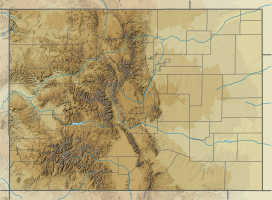Mount Oklahoma
| Mount Oklahoma | |
|---|---|
 Northeast aspect, centered, from Mount Massive | |
| Highest point | |
| Elevation | 13,852 ft (4,222 m)[1][2] |
| Prominence | 745 ft (227 m)[2] |
| Parent peak | Mount Massive[2] |
| Isolation | 1.52 mi (2.45 km)[2] |
| Coordinates | 39°10′44″N 106°30′22″W / 39.1788784°N 106.5061402°W[3] |
| Geography | |
| Location | Continental Divide between Lake and Pitkin counties, Colorado, United States[3] |
| Parent range | Sawatch Range, Massive Massif[2] |
| Topo map(s) | USGS 7.5' topographic map Mount Champion, Colorado[3] |
Mount Oklahoma is a high mountain summit in the Sawatch Range of the Rocky Mountains of North America. The 13,852-foot (4,222 m) thirteener is located 5.7 miles (9.2 km) northeast by north (bearing 33°) of Independence Pass, Colorado, United States, on the Continental Divide separating the Mount Massive Wilderness in San Isabel National Forest and Lake County from the Hunter-Fryingpan Wilderness in White River National Forest and Pitkin County.[1][2][3] The mountain was named in honor of the University of Oklahoma.
Climate
[edit]According to the Köppen climate classification system, Mt. Oklahoma is located in an alpine subarctic climate zone with cold, snowy winters, and cool to warm summers.[4] Due to its altitude, it receives precipitation all year, as snow in winter, and as thunderstorms in summer, with a dry period in late spring.
Historical names
[edit]- Mount Oklahoma – 1967 [3]
- Oklahoma Mount
See also
[edit]- List of Colorado mountain ranges
- List of Colorado mountain summits
- List of Colorado county high points
References
[edit]- ^ a b The elevation of Mount Oklahoma includes an adjustment of +2.139 m (+7.02 ft) from NGVD 29 to NAVD 88.
- ^ a b c d e f "Mount Oklahoma, Colorado". Peakbagger.com. Retrieved November 6, 2014.
- ^ a b c d e "Mount Oklahoma". Geographic Names Information System. United States Geological Survey, United States Department of the Interior. Retrieved November 6, 2014.
- ^ Peel, M. C.; Finlayson, B. L.; McMahon, T. A. (2007). "Updated world map of the Köppen−Geiger climate classification". Hydrol. Earth Syst. Sci. 11. ISSN 1027-5606.

